#Fyodor Andreyevich Bronnikov
Explore tagged Tumblr posts
Text
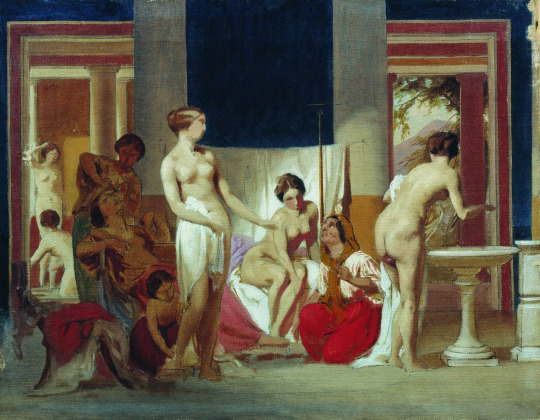
Fyodor Andreyevich Bronnikov (Russian, 1827-1902) Private baths in Pompeii, 1868
#Fyodor Andreyevich Bronnikov#art study#russian art#russian#russia#1800s#art#fine art#european art#classical art#europe#european#oil painting#fine arts#europa#mediterranean#southern europe#pompeii#cradle of civilization#private baths in pompeii 1868#private baths in pompeii#artwork#painting
143 notes
·
View notes
Text
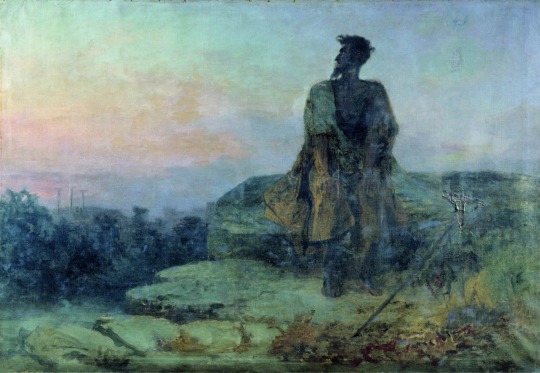
Fyodor Andreyevich Bronnikov, “Judas”, 1874
#judas iscariot#Fyodor Andreyevich Bronnikov#christian art#lost it when I realized what he was looking at#a rare depiction of our boy that actually does come across remorselessly evil
6 notes
·
View notes
Text

I Love this picture so much looking at it fills me with this serene calm and love for life and the light and everything good and when I have the money I will get a giant copy of it to hang in my apartement over my couch may my entire life be filled with new mornings and sunlight and fresh starts and the overwhelming Sensation that I want to be alive!
#personal#me @ this picture: ❤💓💕💖💗❤💓💕💖💗💞💝💕💖#fave#wop#word over art#dream home#Fyodor Andreyevich Bronnikov#pythagoreans' hymn to the rising sun
1 note
·
View note
Photo




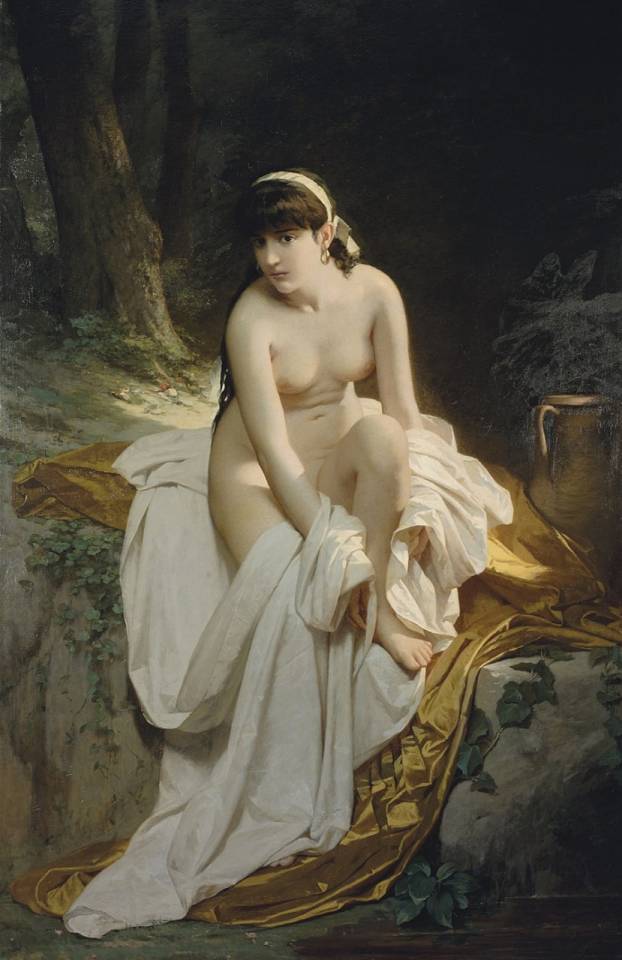
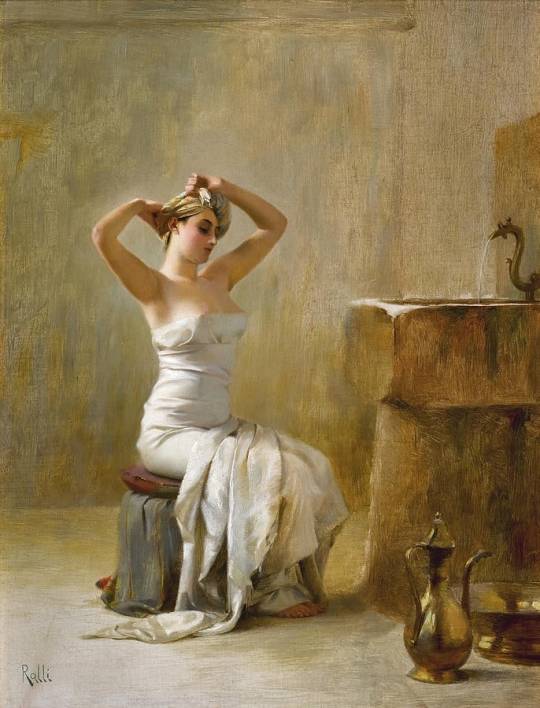
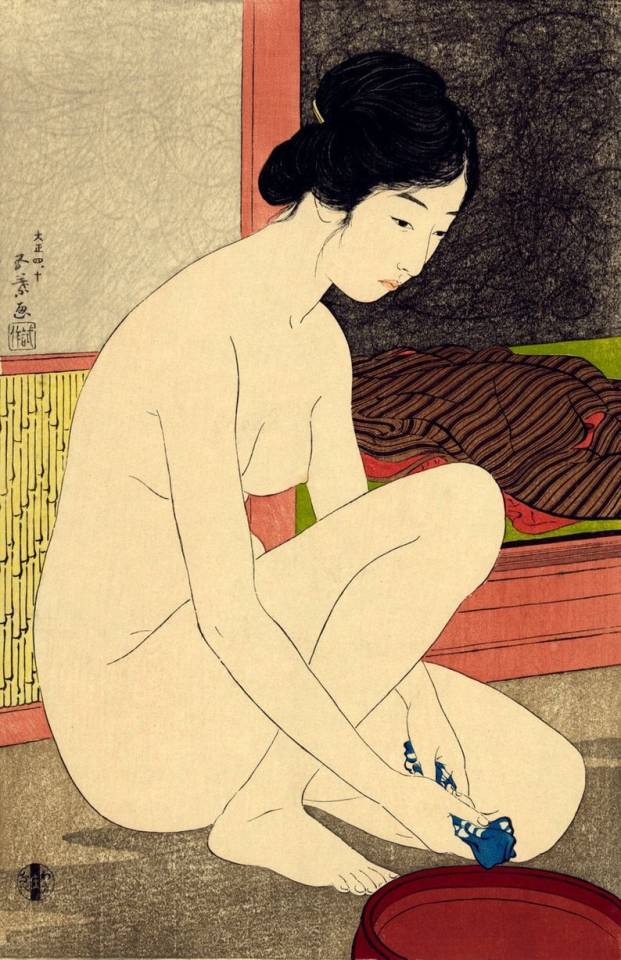


Painting: After the bath 1. Albert Guillaume 2. Léon François Comerre 3. Herman Jean Joseph Richir 4. William-Adolphe Bouguereau 5. Andrea Belloli 6. Theodoros Rallis 7. Goyō Hashiguchi 8. Бронников Фёдор Андреевич / Fyodor Andreyevich Bronnikov 9. Jean-Léon Gérôme More art, free and uncensored in Telegram: https://t.me/katabasis_art
#catharsis#telegram#gallery#albert guillaume#léon françois comerre#herman jean joseph richir#william-adolphe bouguereau#andrea belloli#theodoros rallis#goyō hashiguchi#Бронников Фёдор Андреевич#fyodor bronnikov#jean-léon gérôme#art#painting#old paintings#art history#after the bath#classic art
71 notes
·
View notes
Photo

Fyodor Andreyevich Bronnikov (Russian: Фёдор Андреевич Бронников; 1827–1902) was a Russian-born history and genre painter who spent most of his life in Italy. He displayed an early affinity for drawing and received his first art lessons from his father, who was a decorative painter.[1] At the age of sixteen, when his father died, he packed his bags and went to Saint Petersburg, hoping to enter the Imperial Academy of Arts. After failing to gain admission, he became an apprentice in the workshop of Evstafy Bernardsky [ru], a well known woodcutter. His talent drew the attention of the sculptor Pyotr Clodt, who arranged for him to audit classes at the Academy.[2] In 1850, he was able to become a regular student, and worked with Alexey Markov.[1] He graduated in 1853 and was awarded a stipend to study in Italy for his graduation painting, The Mother of God.
12 notes
·
View notes
Photo


Fyodor Andreyevich Bronnikov (1827-1902) was a Russian-born history and genre painter who spent most of his life in Italy.Pythagoreans Celebrate the Sunrise
463 notes
·
View notes
Text
14 Works, September 17th. is Fyodor Bronnikov's day, his story, illustrated with footnotes #204
14 Works, September 17th. is Fyodor Bronnikov’s day, his story, illustrated with footnotes #204
Fyodor BronnikovThe Italian Tavern, c. 1858Oil on canvasI have no further description, at this time Fyodor Andreyevich Bronnikov (1827–1902) was a Russian-born history and genre painter who spent most of his life in Italy… Please follow link for full post

View On WordPress
0 notes
Photo

Fyodor Andreyevich Bronnikov 1871 ... #fyodorbronnikov ... Fyodor Andreyevich Bronnikov (1827-1902) https://www.instagram.com/p/CC0Nqkzgunc/?igshid=1b9v27q21bcsu
0 notes
Photo

“Pythagoreans’ Hymn to the Rising Sun,” Fyodor Andreyevich Bronnikov
0 notes
Photo
Fyodor Andreyevich Bronnikov, a Russian-born history and genre painter who spent most of his life in Italy.

Portrait of a Lady with a book, 1888, Fyodor Bronnikov
50 notes
·
View notes
Text
The Twenty-sixth Sunday in Ordinary Time
Roman Catholic Proper 21 Revised Common Lectionary Proper 26
Complementary Hebrew Scripture Lesson from The Twelve Prophets: Amos 6:1a, 4-7
Alas for those who are at ease in Zion. Alas for those who lie on beds of ivory, and lounge on their couches, and eat lambs from the flock, and calves from the stall; who sing idle songs to the sound of the harp, and like David improvise on instruments of music; who drink wine from bowls, and anoint themselves with the finest oils, but are not grieved over the ruin of Joseph! Therefore they shall now be the first to go into exile, and the revelry of the loungers shall pass away.
Semi-continuous Hebrew Scripture from the Latter Prophets: Jeremiah 32:1-3a, 6-15
The word that came to Jeremiah from the Lord in the tenth year of King Zedekiah of Judah, which was the eighteenth year of Nebuchadrezzar. At that time the army of the king of Babylon was besieging Jerusalem, and the prophet Jeremiah was confined in the court of the guard that was in the palace of the king of Judah, where King Zedekiah of Judah had confined him.
Jeremiah said, The word of the Lord came to me: Hanamel son of your uncle Shallum is going to come to you and say, “Buy my field that is at Anathoth, for the right of redemption by purchase is yours.” Then my cousin Hanamel came to me in the court of the guard, in accordance with the word of the Lord, and said to me, “Buy my field that is at Anathoth in the land of Benjamin, for the right of possession and redemption is yours; buy it for yourself.” Then I knew that this was the word of the Lord.
And I bought the field at Anathoth from my cousin Hanamel, and weighed out the money to him, seventeen shekels of silver. I signed the deed, sealed it, got witnesses, and weighed the money on scales. Then I took the sealed deed of purchase, containing the terms and conditions, and the open copy; and I gave the deed of purchase to Baruch son of Neriah son of Mahseiah, in the presence of my cousin Hanamel, in the presence of the witnesses who signed the deed of purchase, and in the presence of all the Judeans who were sitting in the court of the guard. In their presence I charged Baruch, saying, Thus says the Lord of hosts, the God of Israel: Take these deeds, both this sealed deed of purchase and this open deed, and put them in an earthenware jar, in order that they may last for a long time. For thus says the Lord of hosts, the God of Israel: Houses and fields and vineyards shall again be bought in this land.
Complementary Psalm 146
Praise the Lord! Praise the Lord, O my soul! I will praise the Lord as long as I live; I will sing praises to my God all my life long.
Do not put your trust in princes, in mortals, in whom there is no help. When their breath departs, they return to the earth; on that very day their plans perish.
Happy are those whose help is the God of Jacob, whose hope is in the Lord their God, who made heaven and earth, the sea, and all that is in them;¹ who keeps faith forever; who executes justice for the oppressed; who gives food to the hungry.
The Lord sets the prisoners free; the Lord opens the eyes of the blind. The Lord lifts up those who are bowed down; the Lord loves the righteous. The Lord watches over the strangers; he upholds the orphan and the widow, but the way of the wicked he brings to ruin.
The Lord will reign forever, your God, O Zion, for all generations. Praise the Lord!
¹This phrase is echoed in Acts 4:23-31, where the believers pray for boldness, in Acts 14:13-18, where Paul and Barnabas react to being worshipped, and in Revelation 10:1-7, which says the mystery of God will be revealed when the seventh angel blows his trumpet.
Semi-continuous Psalm 91:1-6, 14-16
You who live in the shelter of the Most High, who abide in the shadow of the Almighty, will say to the Lord, “My refuge and my fortress; my God, in whom I trust.” For he will deliver you from the snare of the fowler and from the deadly pestilence; he will cover you with his pinions, and under his wings you will find refuge; his faithfulness is a shield and buckler. You will not fear the terror of the night, or the arrow that flies by day, or the pestilence that stalks in darkness, or the destruction that wastes at noonday.
Those who love me, I will deliver; I will protect those who know my name. When they call to me, I will answer them; I will be with them in trouble, I will rescue them and honor them. With long life I will satisfy them, and show them my salvation.
New Testament Epistle Lesson: 1 Timothy 6:6-19
Of course, there is great gain in godliness combined with contentment; for we brought nothing into the world, so that we can take nothing out of it; but if we have food and clothing, we will be content with these. But those who want to be rich fall into temptation and are trapped by many senseless and harmful desires that plunge people into ruin and destruction. For the love of money is a root of all kinds of evil, and in their eagerness to be rich some have wandered away from the faith and pierced themselves with many pains.
But as for you, man of God, shun all this; pursue righteousness, godliness, faith, love, endurance, gentleness. Fight the good fight of the faith; take hold of the eternal life, to which you were called and for which you made the good confession in the presence of many witnesses. In the presence of God, who gives life to all things, and of Christ Jesus, who in his testimony before Pontius Pilate made the good confession, I charge you to keep the commandment without spot or blame until the manifestation of our Lord Jesus Christ, which he will bring about at the right time—he who is the blessed and only Sovereign, the King of kings and Lord of lords. It is he alone who has immortality and dwells in unapproachable light, whom no one has ever seen or can see; to him be honor and eternal dominion. Amen.
As for those who in the present age are rich, command them not to be haughty, or to set their hopes on the uncertainty of riches, but rather on God who richly provides us with everything for our enjoyment. They are to do good, to be rich in good works, generous, and ready to share, thus storing up for themselves the treasure of a good foundation for the future, so that they may take hold of the life that really is life.
New Testament Gospel Lesson: Luke 16:19-31
“There was a rich man who was dressed in purple and fine linen and who feasted sumptuously every day. And at his gate lay a poor man named Lazarus, covered with sores, who longed to satisfy his hunger with what fell from the rich man's table; even the dogs would come and lick his sores. The poor man died and was carried away by the angels to be with Abraham. The rich man also died and was buried. In Hades, where he was being tormented, he looked up and saw Abraham far away with Lazarus by his side. He called out, ‘Father Abraham, have mercy on me, and send Lazarus to dip the tip of his finger in water and cool my tongue; for I am in agony in these flames.’ But Abraham said, ‘Child, remember that during your lifetime you received your good things, and Lazarus in like manner evil things; but now he is comforted here, and you are in agony. Besides all this, between you and us a great chasm has been fixed, so that those who might want to pass from here to you cannot do so, and no one can cross from there to us.’ He said, ‘Then, father, I beg you to send him to my father's house—for I have five brothers—that he may warn them, so that they will not also come into this place of torment.’ Abraham replied, ‘They have Moses and the prophets; they should listen to them.’ He said, ‘No, father Abraham; but if someone goes to them from the dead, they will repent.’ He said to him, ‘If they do not listen to Moses and the prophets, neither will they be convinced even if someone rises from the dead.’”
Year C Ordinary 26, Catholic Proper 26, RCL Proper 21: Sunday
Selections are from Revised Common Lectionary Daily Readings copyright © 1995 by the Consultation on Common Texts. Unless otherwise indicated, Bible text is from New Revised Standard Version Bible (NRSV) copyright © 1989 by the Division of Christian Education of the National Council of Churches of Christ in the United States of America. Used by permission. All rights reserved. Image Credit: Lazarus at the Rich Man's Gate by Fyodor Andreyevich Bronnikov, via Wikimedia Commons. This is a public domain image.
0 notes
Text
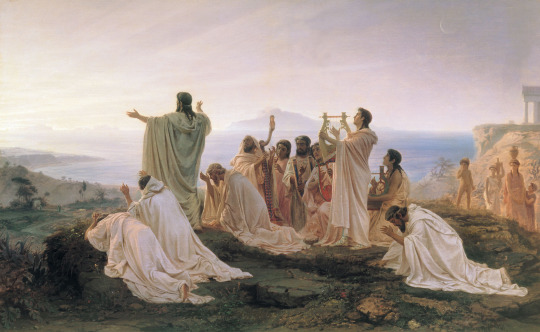
Fyodor Andreyevich Bronnikov (Russian, 1827-1902) Pythagorean hymn to the rising sun, 1869 State Tretyakov Gallery, Moscow
#Fyodor Andreyevich Bronnikov#russian art#russia#1800s#art#fine art#european art#classical art#europe#european#oil painting#fine arts#mediterranean#europa#southern europe#Pythagorean#Pythagorean hymn to the rising sun
132 notes
·
View notes
Text
Horatius
Horatius reads before Maecenas
by Fyodor Andreyevich Bronnikov
(1827–1902) 1863 Odessa Art Museum
Ukraine

0 notes
Photo

Fyodor Andreyevich Bronnikov - Abandoned
490 notes
·
View notes
Photo

Place of Execution in Ancient Rome. The Crucified Slaves, 1878, Fyodor Andreyevich Bronnikov
#Fyodor Andreyevich Bronnikov#Fyodor Bronnikov#Execution#Ancient Rome#Crucified#Slaves#cross#Rome#russian#Crassus
168 notes
·
View notes
Photo

Self-Portrait Fyodor Bronnikov Fyodor Andreyevich Bronnikov (Russian: Фёдор Андреевич Бронников; 1827-1902) was a Russian-born history and genre painter who spent most of his life in Italy.
10 notes
·
View notes